Stock Market Rally On Borrowed Money Living on Borrowed Time?
Stock-Markets / Financial Markets 2009 Jun 13, 2009 - 04:32 AM GMT Consumer Sentiment is on the rise - Confidence among U.S. consumers rose this month for a fourth straight time, reflecting signs that the worst recession in at least five decades may end this year. The Reuters/University of Michigan preliminary index of consumer sentiment increased to 69, the highest level in nine months, from 68.7 in May.
Consumer Sentiment is on the rise - Confidence among U.S. consumers rose this month for a fourth straight time, reflecting signs that the worst recession in at least five decades may end this year. The Reuters/University of Michigan preliminary index of consumer sentiment increased to 69, the highest level in nine months, from 68.7 in May.
Yet consumer spending is a drag on the economy.
Don't get too excited about signs of life in the economy. Some days it seems there's good news everywhere: home sales ticking up, slower job losses, the Dow turning positive for the year. But all that misses a looming reality. American consumers, whose overspending largely got us into this mess, are still under massive pressure, owing to the record debt they racked up during the boom years.
The reason? Household wealth has declined.
U.S. household wealth fell in the first quarter by $1.3 trillion, extending the biggest slump on record, as home and stock prices dropped. Net worth for households and non-profit groups decreased to $50.4 trillion, the lowest level since 2004, from $51.7 trillion in the fourth quarter, according to the Federal Reserve’s Flow of Funds report today. The government began keeping quarterly records in 1952.
As a result, the personal saving rate is increasing for the first time since 2001.
The rally was sparked by borrowed money. Is it living on borrowed time?.
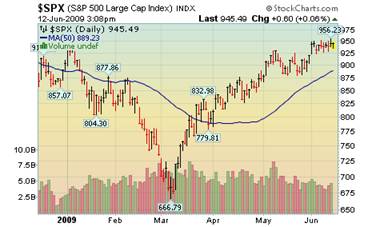 -- U.S. stocks fell, pushing the Standard & Poor’s 500 Index down from a seven-month high, as falling fuel prices sent oil producers lower and technology shares decreased on concern about semiconductor demand. The S&P 500 has rebounded 39 percent from its 12-year low in March after the government and Federal Reserve pledged $12.8 trillion to end the first global recession since World War II. The index trades at about 14.8 times its companies’ earnings from continuing operations during the past year, near the seven- month high of 15.2 reached in May and below the 19.9 average over the last decade.
-- U.S. stocks fell, pushing the Standard & Poor’s 500 Index down from a seven-month high, as falling fuel prices sent oil producers lower and technology shares decreased on concern about semiconductor demand. The S&P 500 has rebounded 39 percent from its 12-year low in March after the government and Federal Reserve pledged $12.8 trillion to end the first global recession since World War II. The index trades at about 14.8 times its companies’ earnings from continuing operations during the past year, near the seven- month high of 15.2 reached in May and below the 19.9 average over the last decade.
High yields in Treasury bonds attracting investors.
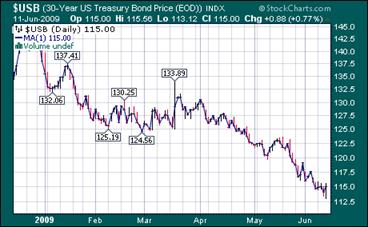 -- Treasuries rose after Japanese Finance Minister Kaoru Yosano said his nation’s confidence in U.S. debt is “unshakable,” reducing concern foreign investors will slow purchases amid record debt sales. Yields on 30-year bonds touched the lowest level in three days. The government’s auction of $11 billion of the securities yesterday attracted the most demand from a group of investors that include central banks since the U.S. resumed selling bonds in 2006.
-- Treasuries rose after Japanese Finance Minister Kaoru Yosano said his nation’s confidence in U.S. debt is “unshakable,” reducing concern foreign investors will slow purchases amid record debt sales. Yields on 30-year bonds touched the lowest level in three days. The government’s auction of $11 billion of the securities yesterday attracted the most demand from a group of investors that include central banks since the U.S. resumed selling bonds in 2006.
Gold may be in for a bumpy ride.
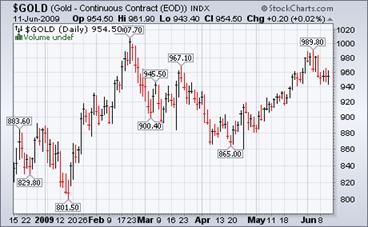 Gold fell the most in a week in New York and London as a stronger dollar reduced demand for the metal as an alternative investment. Other precious metals slid. A rising dollar is putting pressure on gold. In addition, selling pressure seems to hit the precious metal above 960. Most importantly, deflation and not inflation seem to be driving the markets in the coming months. Gold will still be seen as a safe haven for investors, but the road may be bumpy for a while.
Gold fell the most in a week in New York and London as a stronger dollar reduced demand for the metal as an alternative investment. Other precious metals slid. A rising dollar is putting pressure on gold. In addition, selling pressure seems to hit the precious metal above 960. Most importantly, deflation and not inflation seem to be driving the markets in the coming months. Gold will still be seen as a safe haven for investors, but the road may be bumpy for a while.
Japanese stocks meet round number resistance.
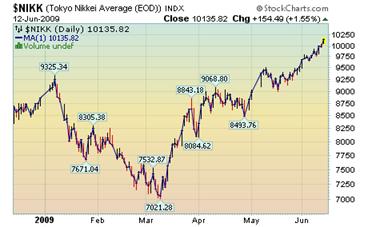 -- Japanese stocks rose, pushing the Nikkei 225 Stock Average above 10,000 for the first time in eight months, as a recovery in the equity market spurred speculation brokerages’ earnings will improve. Simply put, the Nikkei is rising on speculation. It has tagged a point known as round number resistance – 10,000 on the Nikkei. If the speculators have gotten ahead of reality, we should see a pullback from here.
-- Japanese stocks rose, pushing the Nikkei 225 Stock Average above 10,000 for the first time in eight months, as a recovery in the equity market spurred speculation brokerages’ earnings will improve. Simply put, the Nikkei is rising on speculation. It has tagged a point known as round number resistance – 10,000 on the Nikkei. If the speculators have gotten ahead of reality, we should see a pullback from here.
China resuming public offerings of stocks, may see decline.
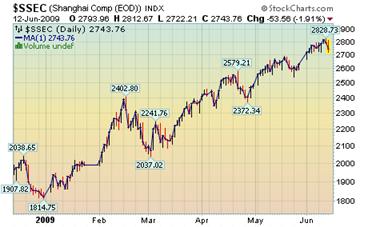 -- China’s benchmark stock index fell the most in almost two months after the 21st Century Business Herald reported the securities regulator will approve initial public offerings as early as this weekend. The resumption of public offerings may allow as many as 32 companies with share-sale proposals approved last year to tap investors to raise up to 70 billion yuan ($10.2 billion), according to estimates from Guotai Junan Securities Co.
-- China’s benchmark stock index fell the most in almost two months after the 21st Century Business Herald reported the securities regulator will approve initial public offerings as early as this weekend. The resumption of public offerings may allow as many as 32 companies with share-sale proposals approved last year to tap investors to raise up to 70 billion yuan ($10.2 billion), according to estimates from Guotai Junan Securities Co.
Japan needs a strong U.S. dollar.
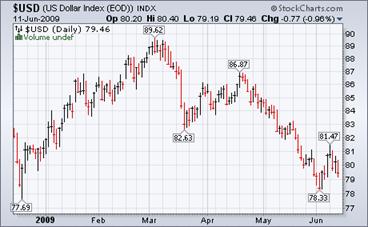 -- The dollar advanced against the euro and the yen after Japanese Finance Minister Kaoru Yosano said his nation’s confidence in U.S. debt is “unshakable” and that the currency’s global status is safe. The reason for the Japanese “confidence” is that they must keep the dollar higher at the expense of the yen. The Japanese economy is already in trouble and a weak dollar will hurt Japanese exports to the U.S.
-- The dollar advanced against the euro and the yen after Japanese Finance Minister Kaoru Yosano said his nation’s confidence in U.S. debt is “unshakable” and that the currency’s global status is safe. The reason for the Japanese “confidence” is that they must keep the dollar higher at the expense of the yen. The Japanese economy is already in trouble and a weak dollar will hurt Japanese exports to the U.S.
Mortgage markets frozen. Housing down for the count.
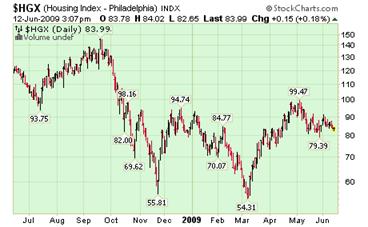 Mish writes, “On May 28 I wrote Mortgage Market Locks Up. Ten year treasury yields started to soar and 30 year mortgages for good borrowers jumped a full point from 4.5% to 5.5%.
Mish writes, “On May 28 I wrote Mortgage Market Locks Up. Ten year treasury yields started to soar and 30 year mortgages for good borrowers jumped a full point from 4.5% to 5.5%.
The question on my mind at the time was whether or not the mortgage action was a brief outlier. It wasn't. Things are now worse… One problem is lenders are requiring applicants to put up $500 for appraisals and if the amounts do not come in, even if they miss by a tiny bit, the deal is denied and the applicant is out $500.”
The price of gasoline is eating into consumer spending.
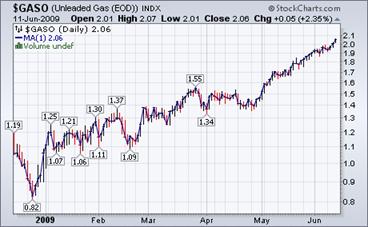 Energy Information Administration Weekly Report suggests that, “Despite the continuing economic recession, recent data indicate a diminishing year-over-year decline in gasoline consumption, while consumption of distillate fuel is continuing to exhibit substantial year-over-year declines.” Gas prices are not expected to approach last summer's wallet-busting $4 per gallon, but they could eat into consumer spending just as the recession is showing signs of easing.
Energy Information Administration Weekly Report suggests that, “Despite the continuing economic recession, recent data indicate a diminishing year-over-year decline in gasoline consumption, while consumption of distillate fuel is continuing to exhibit substantial year-over-year declines.” Gas prices are not expected to approach last summer's wallet-busting $4 per gallon, but they could eat into consumer spending just as the recession is showing signs of easing.
There is plenty of natural gas in storage.
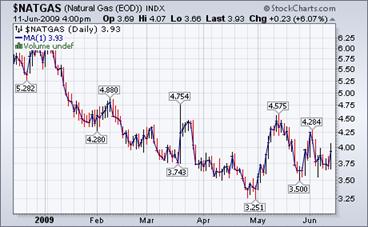 The Energy Information Agency’s Natural Gas Weekly Update reports, “Since Wednesday, June 3, natural gas spot prices fell at most market locations in the Lower 48 States…falling to $3.56 per million Btu (MMBtu), about a 7 percent decline from the previous Wednesday’s level of $3.81. Natural gas in storage was 2,443 billion cubic feet (Bcf) as of June 5, which is 21.8 percent above the 5-year (2004-2008) average.”
The Energy Information Agency’s Natural Gas Weekly Update reports, “Since Wednesday, June 3, natural gas spot prices fell at most market locations in the Lower 48 States…falling to $3.56 per million Btu (MMBtu), about a 7 percent decline from the previous Wednesday’s level of $3.81. Natural gas in storage was 2,443 billion cubic feet (Bcf) as of June 5, which is 21.8 percent above the 5-year (2004-2008) average.”
The world economy on the edge.
Last summer, one of the world's more respected economic commentators predicted that the global downturn would be much worse than anyone had reason to believe. "I've been observing economies around the world for 40 years," said Martin Wolf, the chief economic commentator of the Financial Times. "In all that time, I cannot remember such a combination of economic challenges: the world's balance is shifting." Watch Martin Wolf here.
The Federal Reserve needs transparency.
We are happy to announce that the HR 1207 "Audit the Fed" Bill is now one large step closer to reality, having garnered the necessary 218 co-sponsors to ensure passage. It has, in fact, 222 co-sponsors as of today and more are appearing by the hour. Please click here for the official press release.
The long-time publisher of Grant’s Interest Rate Observer notes, among other things, that, “If the Fed examiners were set upon the Fed’s own documents—unlabeled documents—to pass judgment on the Fed’s capacity to survive the difficulties it faces in credit, it would shut this institution down,” he said. “The Fed is undercapitalized in a way that Citicorp is undercapitalized.” See video.
Our Investment Advisor Registration is on the Web
We are in the process of updating our website at www.thepracticalinvestor.com to have more information on our services. Log on and click on Advisor Registration to get more details.
If you are a client or wish to become one, please make an appointment to discuss our investment strategies by calling Connie or Tony at (517) 699-1554, ext 10 or 11. Or e-mail us at tpi@thepracticalinvestor.com .
Anthony M. Cherniawski,
President and CIO
http://www.thepracticalinvestor.com
As a State Registered Investment Advisor, The Practical Investor (TPI) manages private client investment portfolios using a proprietary investment strategy created by Chief Investment Officer Tony Cherniawski. Throughout 2000-01, when many investors felt the pain of double digit market losses, TPI successfully navigated the choppy investment waters, creating a profit for our private investment clients. With a focus on preserving assets and capitalizing on opportunities, TPI clients benefited greatly from the TPI strategies, allowing them to stay on track with their life goals
Disclaimer: The content in this article is written for educational and informational purposes only. There is no offer or recommendation to buy or sell any security and no information contained here should be interpreted or construed as investment advice. Do you own due diligence as the information in this article is the opinion of Anthony M. Cherniawski and subject to change without notice.
Anthony M. Cherniawski Archive |
© 2005-2022 http://www.MarketOracle.co.uk - The Market Oracle is a FREE Daily Financial Markets Analysis & Forecasting online publication.



